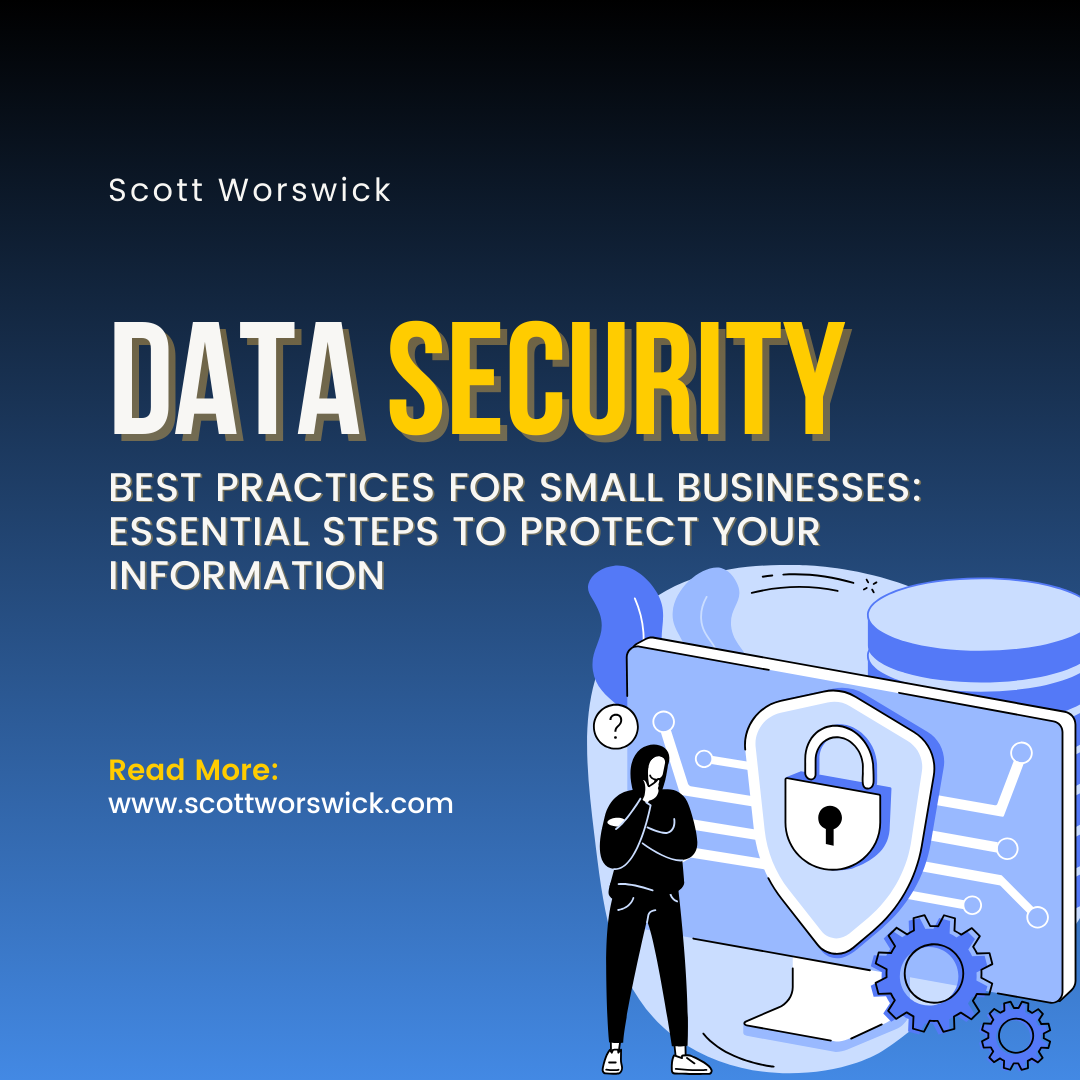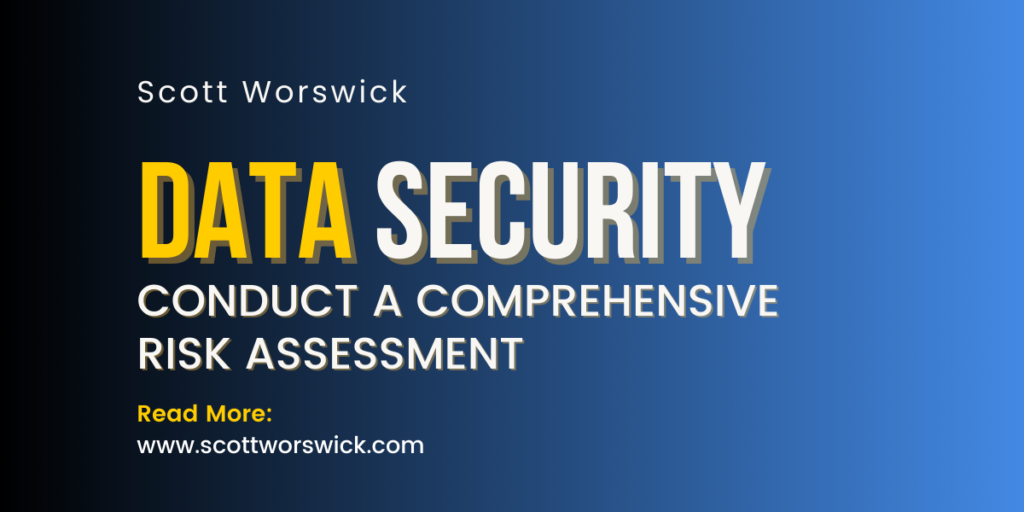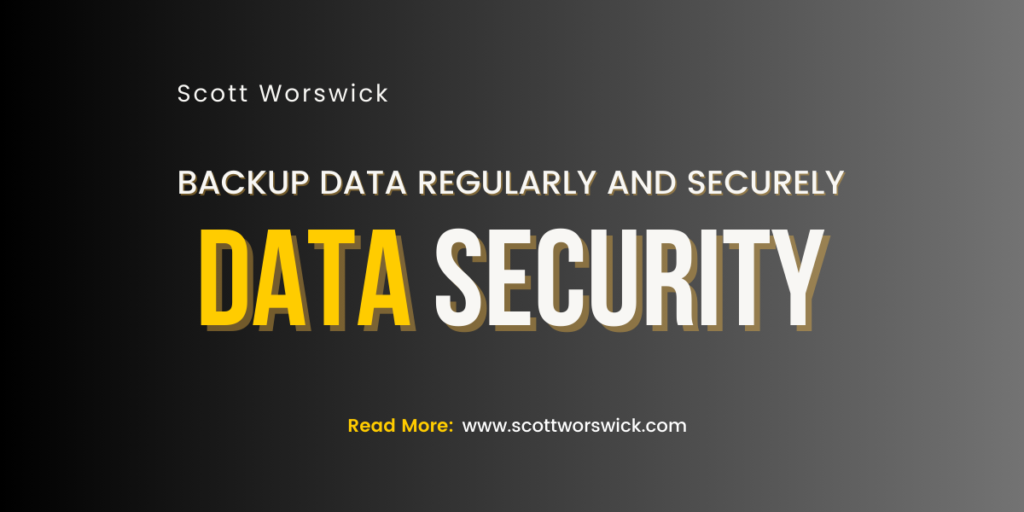In the digital landscape of today’s business world, data serves as the lifeblood of small enterprises, fueling operations, guiding decisions, and fostering customer relationships. However, amidst this wealth of information lies a pressing concern: data security. Small businesses, often seen as prime targets by cybercriminals due to their perceived vulnerability, must prioritize safeguarding their valuable data assets. In this era of heightened cyber threats, implementing robust data security measures is not just advisable—it’s essential for survival and growth.
Within the intricate web of small business operations, data security stands as the sentinel guarding against unseen threats and potential breaches. From customer profiles to financial transactions, every piece of data holds intrinsic value and must be shielded from prying eyes and malicious intent. Recognizing the critical importance of data security isn’t merely about protecting digital assets—it’s about preserving trust, credibility, and the very foundation upon which business relationships are built. Thus, small businesses must embark on a journey to fortify their defenses, employing a proactive approach to safeguarding their information against evolving threats.
Embracing a proactive stance towards data security empowers small businesses to navigate the digital landscape with confidence and resilience. By adopting a holistic approach that encompasses robust access controls, encryption protocols, and employee awareness initiatives, businesses can erect formidable barriers against potential threats. Moreover, prioritizing data security isn’t just a defensive strategy—it’s a strategic investment in the future viability and sustainability of the business. As small enterprises embrace the imperative of data security, they embark on a transformative journey towards safeguarding their most precious asset: information.
Table of Contents
1. Conduct a Comprehensive Risk Assessment
Conducting a comprehensive risk assessment is the foundational cornerstone of any effective data security strategy for small businesses. By meticulously scrutinizing the intricacies of their operations, businesses can identify potential vulnerabilities and proactively mitigate risks before they escalate into full-blown security breaches. This process involves a meticulous examination of the types of data handled, the methods of storage and transmission, as well as the various entry points where threats may lurk. Through this methodical approach, businesses can gain invaluable insights into their data landscape, enabling them to make informed decisions regarding resource allocation and risk mitigation strategies.
In the ever-evolving landscape of cyber threats, small businesses must remain vigilant in their quest to safeguard sensitive information. A comprehensive risk assessment empowers businesses to stay one step ahead of potential threats by identifying weaknesses in their data security infrastructure. Whether it’s vulnerabilities in software systems, gaps in employee training, or overlooked access points, a thorough risk assessment lays bare the hidden dangers that may compromise data security. Armed with this knowledge, businesses can implement targeted solutions tailored to address specific vulnerabilities and bolster their overall resilience against cyber threats.
Furthermore, beyond merely identifying vulnerabilities, a comprehensive risk assessment serves as a catalyst for proactive action and continuous improvement in data security practices. By fostering a culture of vigilance and accountability, businesses can cultivate a mindset where data security becomes ingrained into every facet of operations. Through regular reassessments and updates to their risk management strategies, small businesses can adapt to emerging threats and evolving regulatory requirements, ensuring that their data remains safeguarded in an ever-changing digital landscape.
2. Establish Strong Access Controls
Establishing strong access controls is paramount for small businesses aiming to fortify their data security defenses. By implementing robust authentication mechanisms and stringent authorization protocols, businesses can regulate who has access to sensitive information, minimizing the risk of unauthorized breaches. From multi-factor authentication to role-based access controls, there exists a myriad of tools and techniques that small businesses can leverage to enforce access restrictions and safeguard their valuable data assets. By adopting a proactive approach to access control, businesses can erect formidable barriers against potential threats, safeguarding their information against unauthorized access and malicious intent.
In today’s interconnected digital landscape, the importance of access control cannot be overstated. Small businesses often find themselves targeted by cybercriminals seeking to exploit vulnerabilities in their data security infrastructure. By establishing strong access controls, businesses can mitigate these risks, ensuring that only authorized personnel can view, modify, or delete sensitive data. Moreover, by implementing a principle of least privilege, whereby employees are granted access only to the resources necessary for their role, businesses can minimize the potential impact of insider threats and human error on data security.
Furthermore, beyond merely restricting access to sensitive data, strong access controls foster a culture of accountability and responsibility within the organization. By clearly delineating access rights and privileges, businesses can hold employees accountable for their actions, ensuring that data security remains a top priority across all levels of the organization. Through regular audits and reviews of access permissions, businesses can identify and address any discrepancies or anomalies, strengthening their overall data security posture. In essence, establishing strong access controls is not just about protecting data—it’s about instilling a culture of security consciousness that permeates every aspect of the organization.
3. Encrypt Data Security Across All Platforms
Encrypting data across all platforms is a fundamental step in safeguarding the sensitive information that small businesses rely upon. Encryption serves as a powerful shield against unauthorized access by converting data into an unreadable format that can only be deciphered with the appropriate decryption key. Whether data is stored locally on servers, transmitted over networks, or stored in the cloud, employing encryption protocols ensures that even if intercepted, the data remains unintelligible to prying eyes. By integrating encryption into their data security strategy, small businesses can enhance their resilience against cyber threats and bolster customer confidence in their commitment to protecting sensitive information.
In today’s digital landscape, where cyber threats loom large and data breaches are increasingly common, encryption stands as a crucial line of defense against potential security breaches. By encrypting data both at rest and in transit, small businesses can mitigate the risk of data exposure and safeguard their reputation from the damaging effects of a breach. Moreover, encryption plays a vital role in regulatory compliance, helping businesses meet the stringent data protection requirements imposed by laws such as GDPR and CCPA. By adopting encryption as a standard practice, small businesses can not only protect their data but also demonstrate their commitment to upholding the highest standards of data security and privacy.
Furthermore, beyond merely securing data from external threats, encryption also safeguards against insider risks and unauthorized access within the organization. By implementing robust encryption protocols, businesses can ensure that only authorized personnel with the requisite decryption keys can access sensitive information, minimizing the risk of data leaks or breaches caused by negligent or malicious insiders. Additionally, encrypting data across all platforms provides businesses with greater control over their data, enabling them to track and monitor access more effectively and detect any unauthorized attempts to access or tamper with sensitive information. In essence, encryption serves as a cornerstone of data security, offering small businesses a potent tool to protect their most valuable asset—information—from a myriad of threats.
4. Regularly Update and Patch Systems
Regularly updating and patching systems is a crucial component of any effective data security strategy for small businesses. In today’s rapidly evolving threat landscape, cybercriminals continually exploit vulnerabilities in software and systems to gain unauthorized access to sensitive information. By staying vigilant and ensuring that all software, operating systems, and applications are regularly updated with the latest security patches, small businesses can fortify their defenses against potential cyber threats. This proactive approach not only mitigates the risk of data breaches but also helps to maintain the integrity and reliability of the systems that underpin business operations.
In the realm of data security, complacency is the enemy. Small businesses must recognize that cyber threats are constantly evolving, and what may be secure today could be vulnerable tomorrow. Regularly updating and patching systems is akin to fortifying the walls of a castle against invading forces—it provides an essential layer of protection that strengthens the overall security posture of the organization. By prioritizing timely updates and patches, small businesses can effectively shore up any potential vulnerabilities and minimize the risk of exploitation by malicious actors seeking to compromise their data security.
Moreover, beyond merely safeguarding against external threats, regular updates and patches also play a crucial role in ensuring regulatory compliance. Many data protection regulations, such as GDPR and HIPAA, require businesses to implement security measures to protect sensitive data from unauthorized access or disclosure. Failure to keep systems updated and patched can leave businesses vulnerable to costly fines and legal repercussions. Therefore, by proactively addressing vulnerabilities through regular updates and patches, small businesses can demonstrate their commitment to compliance and safeguard themselves against the financial and reputational damage associated with non-compliance.
Furthermore, adopting a proactive approach to updating and patching systems not only enhances data security but also fosters a culture of resilience and adaptability within the organization. By staying abreast of the latest security trends and emerging threats, small businesses can effectively anticipate and mitigate potential risks before they escalate into full-blown security breaches. This proactive mindset not only strengthens the organization’s ability to protect sensitive data but also cultivates a sense of confidence and trust among customers, partners, and stakeholders. In essence, regular updates and patches serve as a cornerstone of data security, enabling small businesses to stay ahead of the curve and navigate the ever-changing landscape of cyber threats with confidence.
5. Implement Employee Training and Awareness Programs
Implementing employee training and awareness programs is a crucial step in fortifying data security within small businesses. Employees are often the first line of defense against cyber threats, yet they can also inadvertently pose significant risks if they are not adequately trained in data security best practices. By providing comprehensive training on topics such as identifying phishing attempts, creating strong passwords, and securely handling sensitive data, businesses can empower their employees to become vigilant guardians of data security.
In the dynamic landscape of cybersecurity, where new threats emerge daily, ongoing employee training is essential to ensure that staff remain abreast of the latest security trends and best practices. By fostering a culture of security awareness within the organization, businesses can instill a mindset where data security becomes ingrained into the fabric of daily operations. Regular training sessions, workshops, and simulated phishing exercises not only reinforce good security habits among employees but also serve as invaluable tools for identifying and addressing potential vulnerabilities before they can be exploited by malicious actors.
Furthermore, beyond merely imparting knowledge, employee training and awareness programs also play a vital role in fostering a sense of accountability and responsibility within the organization. By emphasizing the importance of data security and the potential consequences of security breaches, businesses can motivate employees to take ownership of their role in safeguarding sensitive information. This proactive approach not only strengthens the organization’s overall security posture but also cultivates a culture of trust and confidence among customers, partners, and stakeholders.
Moreover, investing in employee training and awareness programs is not just a matter of compliance—it’s a strategic investment in the long-term success and sustainability of the business. In an era where data breaches can have far-reaching implications for businesses of all sizes, small businesses must prioritize data security as a fundamental aspect of their operations. By empowering employees with the knowledge and skills they need to protect sensitive information, businesses can mitigate the risk of data breaches and demonstrate their commitment to upholding the highest standards of data security and privacy.
6. Backup Data Regularly and Securely
Regularly backing up data is not just a best practice; it’s a critical component of any small business’s data security strategy. In today’s digital age, where data loss can occur due to various reasons such as hardware failures, cyberattacks, or human error, having reliable backups is essential for ensuring business continuity and minimizing the risk of catastrophic data loss. By implementing a robust data backup strategy, small businesses can safeguard their valuable information assets and mitigate the potential impact of data breaches or unforeseen disasters.
However, it’s not enough to simply back up data; it must also be done securely. Small businesses must ensure that their backup processes adhere to industry best practices for data security, including encryption and access controls. Encrypting backup data helps to protect it from unauthorized access, ensuring that even if backup files are compromised, the information remains safeguarded. Additionally, implementing access controls ensures that only authorized personnel can access and manage backup data, reducing the risk of insider threats or accidental deletions.
Moreover, small businesses must consider the storage location of their backups to ensure maximum security. Cloud-based backup solutions offer a convenient and cost-effective option for storing data offsite, providing redundancy and protection against physical disasters such as fires or floods. However, businesses must carefully evaluate the security measures implemented by their chosen cloud provider to ensure that backup data remains secure and protected from unauthorized access or data breaches. Alternatively, businesses can opt for offline backups stored in a secure location, such as an encrypted external hard drive or tape storage, providing an additional layer of protection against cyber threats.
In conclusion, regular and secure data backups are essential for small businesses looking to protect their valuable information assets and maintain business continuity in the face of potential data loss or security breaches. By implementing a robust backup strategy that includes encryption, access controls, and careful consideration of storage location, small businesses can mitigate the risks associated with data loss and ensure the integrity and availability of their critical business data. Ultimately, investing in data backup is not just a proactive measure—it’s a fundamental aspect of safeguarding the longevity and success of the business.
7. Monitor and Audit Data Access
Monitoring and auditing data access are indispensable practices for small businesses striving to fortify their data security measures. By implementing robust logging and auditing mechanisms, businesses can track and analyze user activities, file access, and system changes to detect and investigate any suspicious behavior promptly. This proactive approach enables businesses to identify potential security threats or unauthorized access attempts before they escalate into full-blown data breaches, safeguarding sensitive information and preserving the integrity of their data security infrastructure.
Furthermore, regular monitoring and auditing of data access not only enhance security but also facilitate regulatory compliance. Many data protection regulations, such as GDPR and HIPAA, require businesses to maintain detailed logs of data access and changes for auditing purposes. By adhering to these regulatory requirements and demonstrating a commitment to transparency and accountability in data handling practices, small businesses can mitigate the risk of fines and penalties associated with non-compliance. Moreover, a robust auditing process can provide valuable insights into potential areas for improvement in data security policies and procedures, enabling businesses to continually refine their practices and adapt to evolving threats.
In essence, monitoring and auditing data access serve as essential pillars of a comprehensive data security strategy for small businesses. By proactively monitoring user activities and auditing data access, businesses can detect and respond to security threats in a timely manner, minimizing the risk of data breaches and preserving the confidentiality, integrity, and availability of sensitive information. Moreover, by ensuring compliance with regulatory standards and leveraging auditing insights to refine data security practices, small businesses can build trust with customers, partners, and stakeholders, demonstrating their commitment to protecting data and upholding the highest standards of data security and privacy.
Conclusion
In conclusion, implementing robust data security measures is not just a necessity but a strategic imperative for small businesses seeking to safeguard their sensitive information in today’s digital landscape. By adopting a proactive approach to data security, businesses can mitigate the risks posed by cyber threats and protect their valuable assets from unauthorized access or disclosure. From conducting comprehensive risk assessments to regularly updating systems, encrypting data, and implementing employee training programs, each step plays a crucial role in fortifying the organization’s defenses against potential breaches. By prioritizing data security, small businesses can not only protect their reputation and customer trust but also ensure compliance with regulatory standards and mitigate the financial and legal risks associated with data breaches.
Moreover, data security is not a one-time task but an ongoing commitment that requires vigilance and adaptability. As cyber threats continue to evolve and regulations become increasingly stringent, small businesses must remain proactive in identifying and addressing potential vulnerabilities in their data security infrastructure. By staying abreast of the latest security trends and best practices, businesses can continually refine their data security strategies and adapt to emerging threats, ensuring that their defenses remain robust and resilient in the face of evolving risks.
Ultimately, investing in data security is an investment in the long-term success and sustainability of the business. By prioritizing data security best practices, small businesses can mitigate the risk of data breaches, protect sensitive information, and maintain the trust and confidence of customers, partners, and stakeholders. By fostering a culture of security awareness and accountability and leveraging the latest technologies and methodologies, small businesses can navigate the complexities of the digital landscape with confidence, knowing that their data is protected against potential threats.







Pingback: Privacy vs Data Security: Finding the Balance in Data Protection -